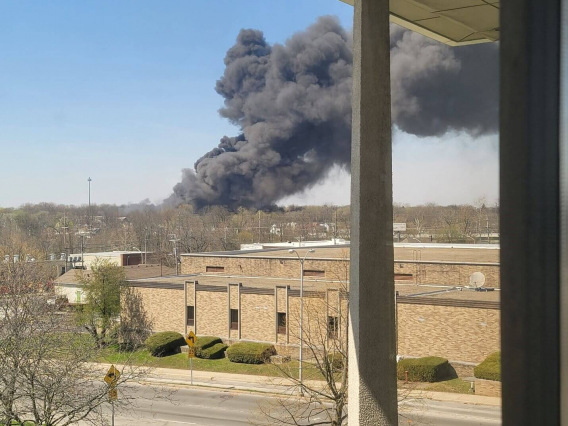Asbestos-Contaminated Debris Found After Indiana Warehouse Fire

Debris contaminated with asbestos material was found in school yards, playgrounds, day cares and private residences following a large fire at a former recycling plant in Indiana earlier this month.
The cancer-causing substance, once widely used in insulation material prior to the 1980s, rained down on some parts of Richmond, Indiana, and nearby Ohio during the blaze.
“Due to the weightless nature of the substance, these materials were lifted into the air as the smoke rose and fell back to the ground as debris,” according to the Environmental Protection Agency. “It is essential not to remove or disturb any debris believed to be from the fire as these materials may contain asbestos, a substance that releases microscopic fibers when disturbed.”
Contractors removed debris from 16 schools, 10 day cares, one community center and two parks in both states. EPA officials will soon begin debris collection at residential properties.
Safely handling and disposing of asbestos is important because the material could put workers and the public at risk of exposure that may lead to an asbestos-related disease such as mesothelioma cancer, lung cancer and asbestosis.
Asbestos is a deadly carcinogen that should only be handled by licensed asbestos abatement professionals. Serious fines and penalties could result if any of the many laws that regulate asbestos are broken.
Fire Releases Toxic Chemical Cloud
The fire started at the former My Way Trading warehouse on April 11. Two large warehouses containing chipped and shredded bulk recycled plastic ignited, releasing a toxic cloud over the city and into Ohio. The cause of the fire remains under investigation.
Officials ordered a half-mile evacuation zone from the incident site and urged residents outside the zone or downwind to shelter in place with doors and windows closed, HVAC units turned off and to keep pets indoors because of the dangerous conditions.
City officials called in the EPA to monitor the air due to the contents of the fire. Within three days, EPA air monitors discovered toxic chemicals in the air near the fire site, including hydrogen cyanide, benzene, chlorine, carbon monoxide and volatile organic compounds.
Hydrogen cyanide interferes with the body’s use of oxygen and can be deadly. It could cause harm to the brain, heart, blood vessels and lungs, according to the Centers for Disease Control and Prevention.
Benzene is harmful to the eyes, skin, airway, nervous system and lungs. It can cause blood cancers such as leukemia, according to the CDC.
Richmond Holds Warehouse Owner Responsible for Fire
EPA investigators quickly alerted the fire department about the detection of hydrogen cyanide and benzene so firefighters could take additional precautions while battling the fire. Firefighters are at high risk of developing mesothelioma.
Richmond Mayor David Snow said city officials had taken the warehouse owner to court over unsafe building conditions and “feared” a fire may break out. The owner had been ordered to clean up the property but ignored the order, officials said.
“That business owner is fully responsible for all of this – everything that’s ensued here at the fire, the damages, the risk that our first responders have taken and risk these citizens are under, are the responsibility of that negligent business owner,” Snow said at a press conference earlier this month.
While fire officials quickly got the fire under control, smoldering hot spots continued to pop up for several days. On April 18, seven days after the blaze ignited, officials declared the fire was officially out.